SOUTH GOWER BOUNDARY ROAD
(Sod and Turf Farms)
Spring: ** Summer: *** Fall: *** Winter: **
Independent Directions to this Site: From Highway 416 take exit 40 (River Road). Loop around to River Road or Regional 19 and go right or northeast on it for 3.3 km to South Gower Boundary Road. Turn right or south on it and go 1.0 km to the first of the South Gower Boundary Road sod and turf farms.
South Gower / Mountain Loop Directions: From Highway 416 take exit 40 (River Road). Loop around to River Road or Regional 19 and go right or northeast on it for 3.3 km to South Gower Boundary Road. Turn right or south on it and go 1.0 km to the first of the South Gower Boundary Road sod and turf farms.
This is the first site in the South Gower / Mountain Loop. It is also in the Rideau River East Side tour. Here you can veer off on the Rideau River East Side route rather than continue south on the South Gower / Mountain Loop. To do so, go to the next site north on the Rideau River East Side route, Gideon Adams Park or the next site south on the Rideau River East Side route, Ferguson Forest Station - Kemptville.
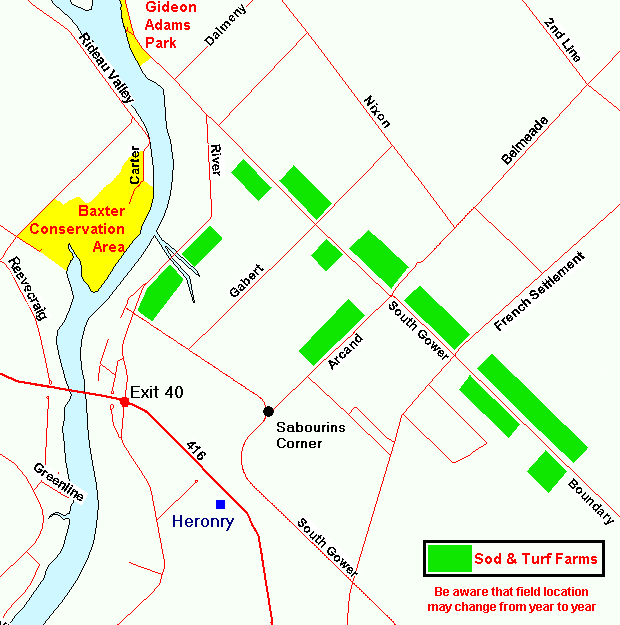 Map of South Gower Boundary Road Area
Map of South Gower Boundary Road Area
Site Description and Birding Information: For nearly 4 km after you reach the first of the sod farm fields, South Gower Boundary Road is lined by this unique habitat, sometimes on both sides. Both River Road and Arcand Road also have turf farm fields. See map for 2003 field locations, but be aware they may change from year to year.
Gulls are attracted to the freshly cultivated and harvested fields and often use the grassy sections for roosting. Killdeer are common breeders and Upland Sandpipers (sometimes in good numbers) use the grassy fields in August to fatten up for the journey south. Other shorebirds can be seen in late summer and early fall as they pass through our area. It is an especially good site for upland shorebirds, such as Black-bellied Plover, American Golden-Plover and the rare Buff-breasted Sandpiper and Whimbrel.
Fields may be in any state; freshly cultivated, freshly seeded, lawn-like green, partly stripped or fully harvested. Each state attracts birds. As well, watch for recent or on-going irrigation. Water, especially when conditions are dry, often attracts good numbers of birds. Spraying water may attract flocks of swallows, while standing water should be checked for shorebirds and herons.
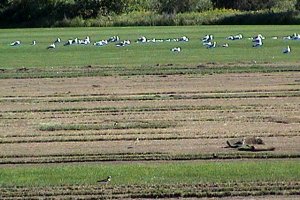 Gulls Resting on River Road Turf Farm
Gulls Resting on River Road Turf Farm
|
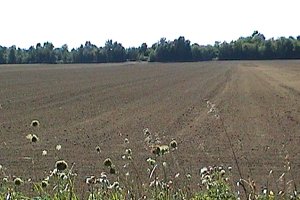 Recently Cultivated Field along Boundary Road
Recently Cultivated Field along Boundary Road
|
Be aware that when drainage parallels the road, you may not be able to see into the hollows; whereas they are easily viewed when ditching is perpendicular to the road. Even large shorebirds such as Greater Yellowlegs can easily disappear for long periods while feeding in the dips. Patience is sometimes rewarded. Alternately, you could deke down one of the field lanes and scan down the hollows from the sides. Remember to ask permission to use private roads. Avoid fields being currently worked.
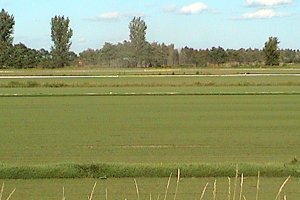 Drainage Parallel to Road
Drainage Parallel to Road
|
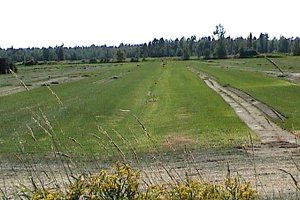 Drainage Perpendicular to Road
Drainage Perpendicular to Road
|
South Gower / Mountain Loop Directions: From wherever you are on South Gower Boundary Road, return to French Settlement Road, which is 3.4 km southeast of River Road, and turn northeast onto it. Go 5.8 km to the end of the gravelled portion of this road (just beyond house number 10761), to the next site on this route, the East End of French Settlement Road.
Return to South Gower / Mountain Loop.
Return to Birding Ottawa Table of Contents.
|




